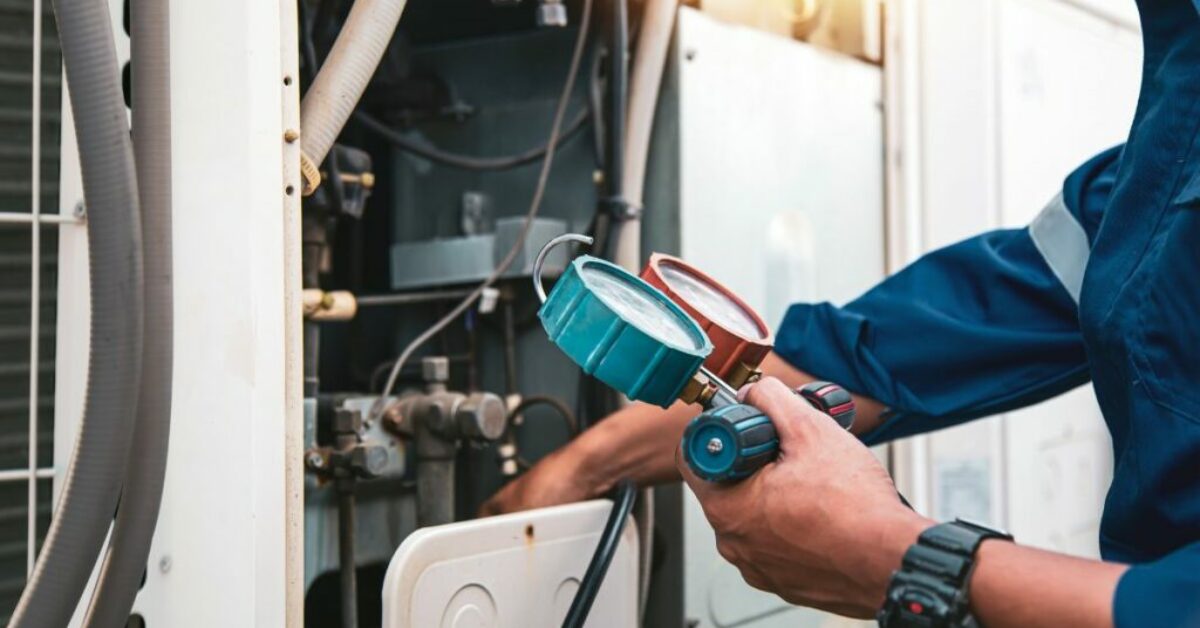How To Become An HVAC Technician?
If you’re considering a career as an HVAC technician, you’re in luck with the increasing demand for HVAC professionals. In this article, we will discuss the steps to take to become an HVAC technician and the relevant skills and benefits required for this career.
Steps To Becoming An HVAC Technician
The path to becoming an HVAC technician is relatively straightforward; however, it requires extensive training and education. HVAC technicians are responsible for installing, maintaining, and repairing heating, ventilation, and air conditioning systems in residential and commercial buildings. HVAC systems are essential for maintaining comfortable indoor temperatures and air quality.
Below are the necessary steps to becoming an HVAC technician:
- Earn a High School Diploma or GED
The first and most important step is to obtain a high school diploma or its equivalent. Advanced mathematics, physics, and electronics are essential classes for aspiring HVAC technicians, as they use these skills daily on the job. In addition to these classes, it’s also beneficial to take courses in blueprint reading, computer applications, and shop mechanics. These courses will provide you with a solid foundation for your HVAC training.
- Get HVAC Training
After high school, you’ll need to obtain specialized training in heating, ventilation, and air conditioning (HVAC). HVAC training programs are typically offered by technical and community colleges and vocational schools. Some high schools even offer HVAC programs as part of vocational education.
In the HVAC training program, you’ll learn the basics of HVAC, including electrical circuits, refrigerants, and principles of heating and cooling. Be sure to verify that the program is accredited by a recognized accreditation agency. Accreditation ensures that the program meets industry standards and that you’ll receive a quality education. - Get HVAC Certification and Licenses
After completing your HVAC training program, it’s necessary to obtain certification and licensing, which demonstrates competence and expertise. The most common certifications are those from the North American Technician Excellence (NATE) or the Refrigeration Service Engineers Society (RSES).
To obtain a license, HVAC technicians would need to pass the Environmental Protection Agency certification exam and state HVAC certification exams, which are required for practicing HVAC in some states. The requirements for certification and licensing vary by state, so be sure to check your state’s requirements before applying. - Gain On-the-Job Experience
Experience is critical to becoming a successful HVAC technician. Working as an apprentice with an experienced HVAC technician will provide you with the relevant hands-on experience required on the job. An apprenticeship program typically lasts between three to five years, depending on state regulations.
During your apprenticeship, you’ll learn how to install, maintain, and repair HVAC systems. You’ll also learn how to diagnose and troubleshoot common problems. This experience is invaluable and will prepare you for a successful career in HVAC. - Continue Education
Finally, it’s essential to continue education by attending seminars and training on new technologies, building codes, and safety procedures. Such education will ensure you stay abreast of industry changes and advancements. HVAC technology is constantly evolving, and it’s essential to stay up-to-date with the latest trends and practices.
Continuing education can also lead to career advancement opportunities. With additional training and certifications, you can become a supervisor, project manager, or even start your own HVAC business.
Becoming an HVAC technician requires dedication, hard work, and a passion for the field. However, the rewards are well worth the effort. HVAC technicians are in high demand, and the job outlook is excellent. According to the Bureau of Labor Statistics, employment of HVAC technicians is projected to grow 4 percent from 2019 to 2029, which is about as fast as the average for all occupations.
Skills Needed For Becoming An HVAC Technician
Becoming an HVAC technician requires technical, physical, and personal skills. Some of these skills include:
- Physical strength and stamina to move equipment and work in different conditions
- Excellent problem-solving and analytical skills
- Good communication skills and the ability to explain technical information to customers
- Attention to detail and accuracy in work
- Computer skills to work with software used for troubleshooting and analysis
- Ability to work in confined spaces and at heights
In addition to these skills, there are other important qualities that HVAC technicians should possess. For example, they should have a strong work ethic and be able to work independently or as part of a team. They should also have good time management skills and be able to prioritize tasks effectively.
Another important skill for HVAC technicians is the ability to stay up-to-date with the latest technologies and industry trends. This requires a willingness to continue learning and expanding their knowledge base throughout their career.
Furthermore, HVAC technicians should have a strong understanding of safety procedures and regulations. This includes knowledge of electrical and mechanical safety, as well as the proper use of personal protective equipment (PPE).
Finally, successful HVAC technicians should possess excellent customer service skills. This includes being able to listen to customers’ concerns, answering their questions, and providing them with clear and concise information about their HVAC system.
A combination of these skills and expertise in HVAC will help you in performing your job and providing quality service to your clients.
What is An HVAC Technician?
An HVAC technician is a highly skilled professional who specializes in the installation, maintenance, and repair of heating, ventilation, and air conditioning systems. These systems are essential for creating comfortable and safe indoor environments, as well as for maintaining the proper functioning of various industrial processes.
As an HVAC technician, you will be responsible for working with a wide range of HVAC systems, from small residential units to larger industrial units. You will also work on refrigeration systems, which are used to keep food and other perishable items at the proper temperature.
One of the most important aspects of an HVAC technician’s job is ensuring that buildings remain comfortable and safe all year round. This involves not only installing and maintaining HVAC systems, but also troubleshooting and repairing any issues that may arise. HVAC technicians are trained to identify and diagnose problems with HVAC systems quickly and efficiently, and to develop effective solutions to fix them.
Another important aspect of an HVAC technician’s job is working with architects and builders to ensure that HVAC systems are installed and work correctly in newly constructed facilities. This involves collaborating closely with other professionals to design and install HVAC systems that meet the unique needs of each building and its occupants.
As an HVAC technician, you may work in a variety of settings, including homes, commercial buildings, factories, and hospitals. You may work for a single employer, such as a heating and cooling company, or you may work as an independent contractor, providing services to a variety of clients.
Overall, the work of an HVAC technician is challenging, rewarding, and essential for the proper functioning of modern society. If you are interested in pursuing a career in this field, there are many opportunities available to you, and with the right training and experience, you can become a highly skilled and respected professional in the HVAC industry.
The Benefits of Working as A HVAC Technician
There are many benefits of becoming an HVAC technician, some of which are outlined below:
- Growing Demand: The demand for HVAC technicians is growing exponentially due to the need for improved energy efficiency in new constructions and renovations.
- Job Security: HVAC technicians will always be in demand as people will always need things repaired or replaced.
- Professional Growth: HVAC technicians have numerous opportunities for growth within the industry, including becoming supervisors or managers.
- Flexibility: HVAC technicians enjoy flexibility in their working hours and locations.
- Good Remuneration: HVAC technicians earn competitive salaries, making it a lucrative career option.
Becoming an HVAC Technician offers a stable and rewarding career with a promising future. The career growth, job security, and good remuneration all make this career a top choice. If you are interested in HVAC technology and have the relevant skills, taking the necessary steps to become an HVAC technician is a worthy investment in your future.




